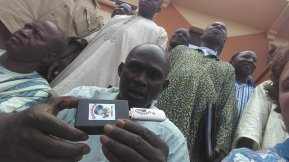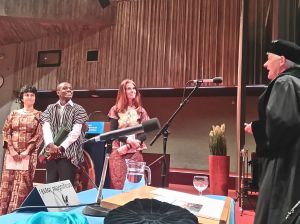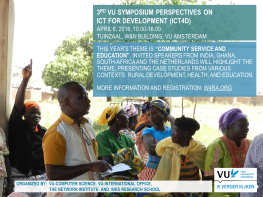This is my old blog. I have merged this blog with my homepage. Therefore, new updates will no longer appear on this blog, but on my homepage: http://victordeboer.com. All blog posts are copied to this new page. To not break any existing links, this blog will remain online for archival purposes.
Paper about automatic labeling in IJDL
 Our paper “Evaluating Unsupervised Thesaurus-based Labeling of Audiovisual Content in an Archive Production Environment” was accepted for publication in the International Journal on Digital Libraries (IJDL). This paper, co-authored with Roeland Ordelman and Josefien Schuurman reports on a series of information extraction experiments carried out at the Netherlands Institute for Sound and Vision (NISV). Specifically, in the paper we report on a two-stage evaluation of unsupervised labeling of audiovisual content using subtitles. We look at how such an approach can provide acceptable results given requirements with respect to archival quality, authority and service levels to external users.
Our paper “Evaluating Unsupervised Thesaurus-based Labeling of Audiovisual Content in an Archive Production Environment” was accepted for publication in the International Journal on Digital Libraries (IJDL). This paper, co-authored with Roeland Ordelman and Josefien Schuurman reports on a series of information extraction experiments carried out at the Netherlands Institute for Sound and Vision (NISV). Specifically, in the paper we report on a two-stage evaluation of unsupervised labeling of audiovisual content using subtitles. We look at how such an approach can provide acceptable results given requirements with respect to archival quality, authority and service levels to external users.

For this, we developed a text extraction pipeline (TESS), pictured here which extracts key terms and matches them to the NISV thesaurus, the GTAA. This journal paper is an extended version of the paper previously accepted at the TPDL conference and here provide an analysis of the term extraction after being taken into production, where we focus on performance variation with respect to term types and television programs. Having implemented the procedure in our production work-flow allows us to gradually develop the system further and to also assess the effect of the transformation from manual to automatic annotation from an end-user perspective.
The paper will appear on the Journal site shortly. A final draft version of the paper can be found here: deboer_ijdl2016evaluating_draft [PDF].
One-off lecture Social Web
Around 40 students joined this year’s “bachelor’s for a day” for the VU IMM programme this year. As in previous years, I give a 45 minute lecture and construct a hands-on session around “The Social Web”. Each year I do a non-scientific survey of Social Web use among the -mostly- 17 year old attendees. This year’s outcome:
- Everybody still uses Facebook (even though for the last couple of years, there are some murmurs about abandoning it
- Everybody uses Whatsapp. No surprise there
- More than half of the students use Snapchat.
- About 1/4 of students use LinkedIn.
- About 1/8 of students actively uses Twitter (one post in the last 3 months)
- Most students have heard of Hyves, but noone ever used it
- Almost noone has heard of Second Life 🙂
- Noone heard of Schoolbank.nl
You can find my slides below. The handson session can be found here.
2nd TMT Workshop in Bamako

Kasadaka as presented by AOPP
From 7-9 May 2016, the second TMT-AOPP workshop was held in Bamako, Mali. This workshop was held in the context of the Tailor Made Training project that VU Amsterdam participates in together with the Malinese farmer organization Association des Organisations Professionnelles Paysannes (AOPP).
During the workshop, which was attended by around 25 AOPP members from all over Mali, we followed up on the results of a previous workshop in 2015, where we co-developed a number of use cases around improving the lives of rural farmers in Mali. Specifically, we developed two prototypes services accessible using simple mobile phones:
- An online marketplace for seeds. Farmers can call in to the system to place offerings of seeds or browse current offers of seeds of various quality levels in a specific region.
- A chicken vaccination service. For this service, an extension worker can register newly born chickens in the system. The system keeps an administration of when farmers need to vaccinate their chickens against specific diseases. The system then calls the farmer and plays a reminder message in his/her language.
 These services were developed on Kasadaka, the cheap and low-resource rapid-prototyping platform for knowledge-rich and voice-accessible services. During the workshop we were able to further test the Kasadaka in the field. A field trip to local farmers and a milk cooperation in nearby Ouelessebougou gave us further context and information in how these services can support locals (see also the video embedded below). Chris van Aart from 2coolmonkeys demonstrated his progress on the Senepedia wiki and two Android applications that allow farmers and organizers to use geo-services to count cows, trees or other objects in the field.
These services were developed on Kasadaka, the cheap and low-resource rapid-prototyping platform for knowledge-rich and voice-accessible services. During the workshop we were able to further test the Kasadaka in the field. A field trip to local farmers and a milk cooperation in nearby Ouelessebougou gave us further context and information in how these services can support locals (see also the video embedded below). Chris van Aart from 2coolmonkeys demonstrated his progress on the Senepedia wiki and two Android applications that allow farmers and organizers to use geo-services to count cows, trees or other objects in the field.

Chris van Aart shows his apps
In addition to these two services, we also presented seven services on the Kasadaka, developed by students of the VUA ICT4D M.Sc. course. These included a weather information service, two vetirenary services, general-purpose knowledge sharing platforms, farmer alert services and a milk market. These services were all very well received and allowed the workshop participants to really see the full potential of voice-enabled information services.
The presentation below shows more information, my personal highlights from the workshop (hence the title) as well as feedback received on the seven student projects.
CultuurLINK Linking Award
Happy and suprised to find the first (and so far only) CultuurLink Linking Award in my mail box yesterday! I checked with the nice people over at Spinque.com and it turns out it was a token of appreciation for being a prolific Cultuurlink user 🙂
I think the vocabulary alignment tool is great and easy to work with, so I can recommend it to anyone with a SKOS vocabulary who wants to match it with any of the major cultural thesauri in the ‘Hub’. Thanks to the people at Spinque for the great tool and the nice gesture!

Dr. Nana Baah Gyan and the Web for Rural Development

Freshly minted dr. Nana flanked by his two paranimphs receives the laudation from supervisor prof. Akkermans.
On 5 april 2016, Nana Baah Gyan successfully defended his PhD thesis “The Web, Speech Technologies and Rural Development in West Africa, An ICT4D Approach” in front of the reading committee at Vrije Universiteit Amsterdam. Dr. Nana worked as a PhD researcher mostly in the context of the FP-7 VOICES project and was supervised by prof. Hans Akkermans and dr. Victor de Boer.
Nana investigated the history of speech systems in developing countries. He discussed and developed strategies for requirements harvesting for an instance of an ICT4D project under rural conditions, the results of which led to an actual implementation of voice-based ICT tools for rural farmers in Mali.
His thesis furthermore deals with evaluating the impact of the project on the lives of stakeholders involved as well as the potential such tools and systems hold for future research. The thesis also discusses what ICT4D generally means for education in West Africa and beyond.
You can read more about Nana’s research in his thesis [PDF] or on the http://w4ra.org site.
A look back at the 3rd VU ICT4D symposium

VU Rector Prof. Subramaniam opens the symposium
On 6 April 2016, the Third International Symposium “Perspectives on ICT for Development (ICT4D)” was hosted by the VU Network Institute, the Netherlands Research School for Information and Knowledge Systems SIKS, the Computer Science Department and VU International Office. This year’s theme was “Community Service & Education”. A great team of invited speakers from India, Ghana, South-Africa and the Netherlands discussed the merits, challenges and research agendas for ICTs for Development, presenting case studies from various contexts: rural development, health, and education.
 The symposium showed different technical solutions, including mobile technologies and small and cheap hardware to cope with local contexts in developing countries. Different speakers also discussed bottom-up methodologies designed for the local context to discover and co-develop interesting ICT solutions and services.
The symposium showed different technical solutions, including mobile technologies and small and cheap hardware to cope with local contexts in developing countries. Different speakers also discussed bottom-up methodologies designed for the local context to discover and co-develop interesting ICT solutions and services.
You can watch the entire event through the recorded livestream as presented below. Speakers presented in blocks of 2 around a single topic or location and engaged in discussion after the second speaker. We here present a list of speakers, their timestamp in the recording (including a direct link) as well as PDF slides for their presentations (all rights remain with the original authors).
0.00 Welcome by Symposium Chairs Victor de Boer and Anna Bon (Vrije Universiteit Amsterdam) [Slides: Victor Introduction]
0.00.40 Opening address by the VU Rector Prof. Dr. Vinod Subramaniam
0.06.40 VU-Informatics/ICT4D: Gossa Lô & Romy Blankendaal (Vrije Universiteit Amsterdam) [Slides: Gossa Lo Romy Blankendaal]
0.24.39 VU-Informatics/ICT4D: Dr. Stefan Schlobach (Vrije Universiteit Amsterdam) [Slides: Stefan Schlobach]
1.18.52 Ghana: Prof. Dr. Saa Dittoh (University for Development Studies, Tamale, Ghana) [Slides: Saa_Dittoh]
1.39.46 Ghana: Dr. Nana Baah Gyan (Accra, Ghana) [Slides: Nana_Baah_Gyan]
2.05.59 India: Prof. Dr. Maneesha Ramesh (Amrita University, India) [No slides available]
2.32.16 India: Prof. Dr. Jacqueline Broerse (Director Athena Institute VU) [Slides: Jacqueline_Broerse]
3.49.48 Water and Data: Frank Annor (TU Delft / TAHMO) [No slides available]
4.10.42 Water and Data: Annabelle Poelert (AKVO, Amsterdam) [Slides: Annabelle Poelert]
4.51.40 South-Africa: Prof. Dr. Mmantsae Moche Diale (University of Pretoria, South-Africa) [Slides: Mmantsae Diale]
5.18.10 South-Africa: Prof. Dr. André Ran (Vrije Universiteit Amsterdam) [Slides: Andre_Ran]
5.48.30 Wrap up by Symposium Chairs
ICT Open 2016
Below you find some impressions from ICT.Open 2016. At this very nice event members from the Web and Media group and VU master students presented their ICT research.
The images show me presenting the Observe project’s achievements so far. Oana Inel presenting the DIVE demo, Anca and Oana accepting the SIKS poster award, Gossa Lo presenting Kasadaka to demo jury members, three Web and Media posters and a nice presenation from Google on AlphaGo.
3rd ICT4D Symposium at VU
[Cross-posted from http://w4ra.org]
On 6 April 2016, the Third International Symposium “Perspectives on ICT for Development (ICT4D)” will be hosted by the VU Network Institute, the Netherlands Research School for Information and Knowledge Systems SIKS, the Computer Science Department and VU International Office. This year’s theme is “Community Service & Education”. Invited speakers from India, Ghana, South-Africa and the Netherlands will highlight the theme, presenting case studies from various contexts: rural development, health, and education.
@VU Tuinzaal, W&N building, (Ground floor, between S/T/U corridors) De Boelelaan 1081, 1081 HV Amsterdam, The Netherlands. Symposium chairs: Dr. Victor de Boer (VU/FEW/INF) & Drs. Anna Bon (VU International Office/CIS). For more information and registration (free), visit http://w4ra.org/
Multitasking Behaviour and Gaze-Following Technology for Workplace Video-Conferencing.
[This post was written by Eveline van Everdingen and describes her M.Sc. project]
Working with multiple monitors is very common at the workplace nowadays. A second monitor can increase work efficiency, structure and a better overview in a job. Even in business video-conferencing, dual monitors are used. Although the purpose of dual monitor use might be clear to the multitasker, this behaviour is not always perceived as positive by their video-conferencing partners.

Gaze direction of the multitasker with the focus on the primary monitor (left), on the dual monitor (middle) or in between two monitors when switching (right).
Results show that multitasking on a dual screen or mobile device is indicated as less polite and acceptable than doing something else on the same screen. Although the multitasker might be involved with the meeting, he or she seems less engaged with the meeting, resulting in negative perceptions.

Effect of technology on politeness of multitasking
Improving the sense of eye-contact might result in a better video-conferencing experience with the multitasker, therefore a gaze-following tool with two webcams is designed (code available at https://github.com/een450/MasterProject ). When the multitasker switches to the dual screen, another webcam will catch the frontal view of the multitasker. Indeed, participants indicate the multitasking behaviour as being more polite and acceptable with the dynamic view of the multitasker. The sense of eye-contact is not significantly more positive rated with this experimental design.
These results show that gaze-following webcam technology can be successful to improve collaboration in dual-monitor multitasking.
For more information, read Eveline’s thesis [pdf] or visit the project’s figshare page.
Example of a video presented to the experiment participants.







